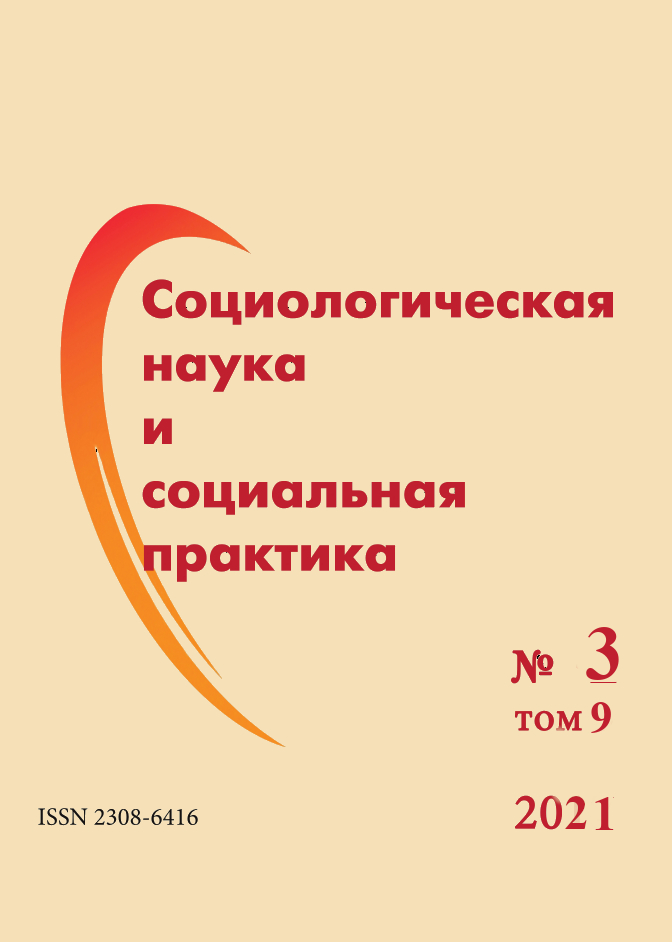Оценка деятельности российских государственных и общественных институтов в этноконфликтной сфере
Научная статья
Аннотация
Литература
2. Главные российские институты: общественная оценка. Аналитический обзор // ВЦИОМ : [сайт]. 26.11.2020. URL: https://wciom.ru/analytical-reviews/analiticheskii-obzor/ glavnye-rossiiskie-instituty-obshchestvennaja-ocenka (дата обращения: 18.04.2021).
3. Горшков М. К. О гармонизации межэтнических отношений в пореформенной России: контекстуальный подход / М. К. Горшков // Гуманитарий Юга России. 2017. Т. 6. № 2. С. 14–25.
4. Горшков М. К. Синтез этнонационального и гражданского как основа Российской идентичности / М. К. Горшков, И. О. Тюрина // Вестник Российского университета дружбы народов. Серия: Социология. 2018. Т. 18, № 1. С. 44–57. DOI: 10.22363/2313-2272-2018-18-1-44-57.
5. Государственные и общественные институты: оценки деятельности. Аналитический обзор // ВЦИОМ : [сайт]. 27.12.2018. URL: https://wciom.ru/index.php?id=236&uid=9494 (дата обращения: 18.04.2021).
6. Доминанты. Поле мнений. Выпуск 18 // ФОМ : [сайт]. 14.05.2021. URL: https://fom.ru/Dominanty/14573 (дата обращения: 17.05.2021).
7. Дробижева Л. М. Общероссийская идентичность и уровень межнационального согласия как отражение вектора консолидационных процессов // Социологические исследования. 2017. № 1 (393). C. 25–36.
8. Дубровина М. А. Межнациональное согласие как фактор бесконфликтного развития России // Вестник Саратовской государственной юридической академии. 2014. № 1 (96). С. 177–181.
9. Ершов Б. А. Деятельность русской православной церкви по противодействию экстремизму и терроризму в современной России / Б. А. Ершов, Я. Я. Лубкин // Исторические, философские, политические и юридические науки, культурология и искусствоведение. Вопросы теории и практики. 2016. № 11–2 (73). С. 97–99.
10. Измерение степени ценностной солидаризации и уровня общественного доверия в российском обществе. Аналитический обзор по результатам анализа вторичных источников. М. : ЦИРКОН, 2018. 81 с. URL: http://www.zircon.ru/upload/iblock/5cd/Doverie_i_solidarizacija_Obzor.pdf (дата обращения: 15.03.2021).
11. Казарян К. А. Межнациональные конфликты и пути их решения / К. А. Казарян, С. Ю. Иванова // Научный альманах. 2016. № 1–3 (15). С. 287–290. DOI: 10.17117/ na.2016.01.03.287
12. Касюк А. Я. Религиозно-политический экстремизм – угроза национальной безопасности России // Вестник Московского государственного лингвистического университета. Общественные науки. 2017. № 3 (787). С. 48–57.
13. Ким А. С. Этнический национализм в массовом сознании постсоветской России / А. С. Ким, Е. Ю. Довгополов // Россия и современный мир. 2017. № 1 (94). С. 72–84.
14. Михеев В. А. Природа и практика развития межнационального согласия / В. А. Михеев // Власть. 2019. Т. 27, № 3. С. 276–280. DOI: 10.31171/vlast.v27i3.6456
15. Найденко В. Н. Экспертная оценка негативных проявлений, обусловливающих этнонациональные конфликты в современной России // Социологическая наука и социальная практика. 2020. Т. 8, № 3 (31). С. 149–164. DOI: 10.19181/snsp.2020.8.3.7493
16. Найденко В. Н. Этноконфликтность в контексте национальной безопасности России // Полис. Политические исследования. 2020. № 1. С. 150–162. DOI: 10.17976/ jpps/2020.01.11
17. Рейтинги доверия политикам, оценки работы президента и правительства, поддержка политических партий. Аналитический обзор // ВЦИОМ : [сайт]. 19 февраля 2021. URL: https://wciom.ru/analytical-reviews/analiticheskii-obzor/reitingi-doverija-politikam-ocenki-rabotyprezidenta-i-pravitelstva-podderzhka-politicheskikh-partii-19022021 (дата обращения: 17.05.2021).
18. Самсонова Т. Н. Основные проблемы и направления достижения консолидации российского общества / Т. Н. Самсонова, Д. Н. Цыганкова // Теория и практика общественного развития. 2020. № 11 (153). С. 24–31. DOI: 10.24158/tipor.2020.11.3
19. Социально-структурные факторы консолидации российского общества / И. И. Елисеева [и др.] ; отв. ред. И. И. Елисеева, Г. В. Еремичева. СПб. : Нестор-История, 2012. 204 с. http://socinst.ru/sites/default/files/books/SSFKRO.pdf (дата обращения: 15.04.2021).
Поступила: 19.05.2021
Опубликована: 28.09.2021








 Издатель: Федеральное государственное бюджетное учреждение науки
Издатель: Федеральное государственное бюджетное учреждение науки